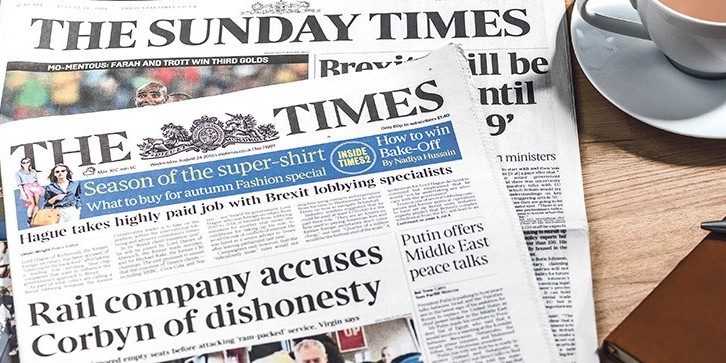The author of the article has been previously accused of “Islamophobia” and “racism”.
Qatar has slammed an article published by UK-based The Times that accused the the Gulf state of allegedly funding terrorism in Syria.
A statement by the Government Communications Office [GCO] dismissed the June 4 article as “baseless”, “misleading” and “factually inaccurate”.
The article claimed several Qatari figures and institutes played “a central role in a secret money laundering operation to send hundreds of millions of dollars to jihadists in Syria,” according to a case filed at a UK court.
This allegedly involved two Qatari banks, several charities, wealthy businessmen, leading politicians and civil servants, the controversial article claimed.
The complainants claim they were tortured in order to maintain their silence on the reported transactions.
Hard-hitting piece from the Times' Andrew Norfolk on attitudes to women & extremism https://t.co/NYfsdjSP5f pic.twitter.com/2oIxCUG1YY
— Sophy Ridge (@SophyRidgeSky) May 27, 2017
The GCO statement said the story was dropped by other media outlets due to a lack of factual basis after being shown the same falsified information. However, The Times went ahead with it.
“Despite Qatar engaging with The Times on these issues, they chose to publish falsehoods, in an apparent abandonment of their journalistic responsibilities,” read the GCO’s statement.
‘Islamophobic’ reporting
The author Andrew Norfolk “has a well-documented history of promoting Islamophobic sentiment and this article is another milestone in that effort,” the statement added, highlighting how the UK’s press regulator, the Independent Press Standards Organisation [IPSO], had also previously ruled that Norfolk had “distorted” reports about Muslims.
“The newspaper has also been challenged by a parliamentary committee over Norfolk’s Islamophobic articles. It is concerning that in such polarised times a journalist with such a track record is allowed free reign to publish in the Times,” said the GCO.
The Times’ chief investigative reporter’s work has been denounced by several journalists as “unethical” for feeding rising Islamophobia and hate crimes in the UK, with headlines that regularly place more emphasis on race and religion rather than the main reported issues.
According to a 2019 report by UK-based Media Reform Coalition, Norfolk published three sensationalist articles over the span of 15 months that portrayed Muslims as threatening, inciting hate against those who follow the religion.
“This resulted not just in a litany of falsehoods about Muslims, but served to amplify an increasingly prevalent Islamophobia and fuel an emboldened racist agenda in the context of a higher level of hate crimes,” read the report.
Read also: African journalists organisation slams ‘despicable’ UAE campaign against Qatar 2022
The Media Reform Coalition noted that the articles were published during an alarming rise in hate crimes against Muslims in the UK that came as a fiery Islamophobic election campaign for former US President Donald Trump raged on across the pond.
The Times later condemned the report, saying it was “mischievous and ideologically-motivated attempt to smear a reporter long recognised as one of the bravest and most scrupulous in his field”.
The notorious anti-Islam “Punish A Muslim Day” which saw letters warning of an attack on those of the same religion took place during the same time period.
According to 2019 UK Government data, hate crimes in 2018-2019 doubled since the 2012-2013 time period, with 3,530 offences targeting Muslims recorded by the police, amounting to 47% of the total recorded crimes.
In a previous report, which The Times took down, Norfolk compared people from Pakistan to “terrorists” despite ongoing targeting of Pakistanis in the UK at the time.
The controversial journalist also defended one of his stories regarding the abuse of a Christian child under the foster care of “Muslim parents” saying he “acted in the “public interest”.
Norfolk’s pieces also appear to be a violation of the National Union of Journalists’ [NUJ] code of conduct, which says that a journalist shall produce “no material likely to lead to hatred or discrimination on the grounds of a person’s age, gender, race, colour, creed, legal status, disability, marital status, or sexual orientation”.
In its statement, the GCO also reiterated the role of Qatar’s laws and systems regarding combatting and preventing the financing of terrorism.
“Along with these safeguards, Qatar has championed some of the strictest laws and regulatory framework to combat money laundering. Qatar is absolutely resolute in these comprehensive efforts to ensure that terrorism is not funded anywhere,” said the GCO, stressing that Doha will continue to work with the UK and the international community to fight global terrorism.
Just last year, Qatar signed an agreement with the United Nations [UN] to establish a UNOCT Programme Office on Parliamentary Engagement in Preventing and Countering Terrorism in Doha.
The move is in line a previous agreement to support the UN’s Global Counter-Terrorism Strategy.
Follow Doha News on Twitter, Instagram, Facebook and Youtube







